![[The Future of Korean Democracy and Institutional Reform] Polarized Politics, Fissured Diplomacy: How Partisanship Imperils South Korea’s Foreign Policy](/data/bbs/eng_workingpaper/20250408134451604354908.png)
[The Future of Korean Democracy and Institutional Reform] Polarized Politics, Fissured Diplomacy: How Partisanship Imperils South Korea’s Foreign Policy
Working Paper | 2025-04-08
Yul Sohn
President, EAI; Professor, Yonsei University
Sohn Yul, President of the East Asia Institute (EAI) and Professor at Yonsei University, analyzes the impact of domestic political polarization on foreign policy, noting that ideological confrontation is increasingly reflected in diplomatic decisions. He contends that support for foreign policy is now driven more by partisan affiliation than by ideological conviction, cautioning that this development impedes bipartisan consensus and undermines the continuity and effectiveness of Korea’s diplomacy.
I. Introduction
The polarization of domestic politics has, as a corollary, led to the polarization of foreign policy. Partisan confrontation and conflict are repeatedly played out over key foreign policy issues. This phenomenon is not confined to a single nation but is a global trend. In advanced democracies such as the United States and Europe, political polarization has manifested in heightened partisan hostility, legislative paralysis, and the rise of populism. Diverging perceptions of external threats among political factions have widened, resulting in differing policy responses. In the United States, the ideological divide between the Republican and Democratic parties on major international issues has deepened, with significant policy shifts occurring after changes in administration. This growing polarization has fueled legitimate concerns, culminating in the 2018 Chicago Council on Global Affairs survey, in which experts identified domestic political polarization as the foremost threat facing the nation.
For South Korea, with its perennial challenges of national division, geographic proximity to major powers, and structural reliance on external economic relations, formulating a prudent foreign policy holds significance beyond mere national interest and conveys existential importance. However, rather than advancing a bipartisan grand strategy rooted in national interest amid global upheavals—including the Trump contingency, great power strategic competition, and nuclear threats—South Korean foreign policy is increasingly subjected to domestic partisan pressures.
An analysis of a series of public opinion surveys conducted by the East Asia Institute (EAI) from 2021 to 2025 yields seven key insights.
First, South Korean foreign policy fundamentally rests on a bipartisan consensus regarding the U.S.-ROK alliance as a cornerstone, support for an open international economic order, and active engagement in multilateral institutions as a responsible member of the international community. However, substantial partisan differences emerge in specific policy areas. Regarding U.S. policy, conservatives (supporters of the People Power Party (PPP)) prioritize strengthening the alliance, whereas progressives (supporters of the Democratic Party (DP)) emphasize establishing a more equal bilateral relationship. In policy towards North Korea, conservatives advocate for reinforcing security measures, while progressives emphasize expanding inter-Korean engagement. On Japan, conservatives call for future-oriented cooperation in functional domains, while progressives stress the resolution of historical disputes.
Second, the degree of polarization varies across issue areas in foreign policy. While overall polarization has intensified, policies toward North Korea and Japan exhibit far greater divisions than other areas, whereas partisanship exerts a comparatively weaker influence regarding the United States. A case on point is the rare bipartisan convergence on policies towards China, which largely stems from widespread anti-Chinese sentiment among the general public.
Third, partisan differences in policy stances stem less from fundamental divergences in ideological convictions, values, or worldviews concerning international politics and more from the spillover effects of domestic political polarization. The tendency to oppose policies championed by the opposing faction, irrespective of substantive content, is replicated in foreign policy debates. This dynamic suggests that obstructing or discrediting the opposition’s achievements is often prioritized over advancing shared national interests.
Fourth, as illustrated by the highly polarized debates on North Korea and Japan policies, both factions tend to perceive each other in stark moral binaries as they cast the opposition as unpatriotic or even unethical. This dynamic leads to the outright rejection of meaningful political negotiation or compromise. Terms such as ‘pro-North forces,’ ‘anti-state elements,’ ‘pro-Japan collaborators,’ ‘domestic traitors,’ and ‘humiliating diplomacy’ exemplify how foreign policy discourse is increasingly driven by emotional and ideological prejudices rather than rational deliberation.
Fifth, the public divisions revealed in the survey are, to a considerable extent, a product of political manipulation by partisan leaders. The polarization among political elites is transferred to their supporters, intensifying public fragmentation (Bullock 2011). In extreme cases, major policy issues are deliberately framed as ‘wedge issues’ to divide the electorate and force binary choices, thereby consolidating political support. Presidents, in particular, tend to dismiss opposing viewpoints and unilaterally push their agenda, relying on the unwavering backing of their partisan base. Such practices undermine democratic accountability in governance.
Sixth, domestic polarization not only weakens diplomatic leverage but also frequently results in policy delays or superficial stopgap measures. In the context of the ‘two-level game’ of international negotiations, the inability to secure domestic approval and support undermines a nation’s credibility in external negotiations, thereby diminishing its bargaining power. The domestic discord surrounding the deployment of the Terminal High Altitude Area Defense (THAAD) systern between 2014 and 2017 significantly weakened the South Korea’s negotiating position with China, culminating in the controversial 2017 ROK-China agreement. Similarly, the internal divisions following the South Korean Supreme Court’s rulings on forced labor during the Japanese colonial period (2018–2019) led to government inaction and the adoption of makeshift measures, ultimately exacerbating diplomatic tensions with Japan.
Finally, if partisan strife persists, the voices of the moderate majority will be drowned out, making the establishment of a bipartisan foreign policy increasingly unattainable. Amid the fundamental transformation of the global order—marked by the decline of U.S. hegemony, the retreat of globalization, intensifying technological competition, and the escalating threat posed by North Korea’s nuclear and missile advancements—the South Korean faces an unprecedented imperative to forge a “coherent and enduring national strategy.” Institutional reforms aimed at overcoming polarization will not only be crucial for restoring democratic governance but also serve as a fundamental prerequisite for enhancing the South Korea’s international role and influence.
II. Public Opinion and Polarization
Polarization, in general, refers to the increasing divergence and hardening of political, social, and economic views, as well as emotional responses, behaviors, and interests among different groups. Ideological polarization specifically denotes the phenomenon wherein the ideological positions of opposing groups move further apart, leading to a contraction of the political center. For instance, this occurs when conservative groups shift further from progressive groups, while the proportion of centrist or independent individuals decreases (Ha 2022, 330).
Conversely, when the size of the centrist or independent group remains stable while partisan allegiances grow more pronounced, particularly as supporters of one party develop strong emotional hostility toward the opposing party, this phenomenon is known as affective polarization or partisan polarization. Unlike ideological polarization, which arises from policy disagreements on specific issues, affective polarization is defined by the intensity of animosity toward the opposing political faction (Ha 2022, 332).
Cross-reference of the EAI’s national surveys on presidential success conditions from October 2021 with the January 2025 survey exploring polarization and democratic perceptions reveals an enduring ideological landscape among South Korean citizens, characterized by negligible variations in overall political orientation. The proportion of progressives and conservatives stands at 27% and 26%, respectively, while centrists constitute 46% of the population, indicating no significant ideological polarization ([Table 1]).
[Table 1] Ideological Landscape of Koreans: 2021 and 2025
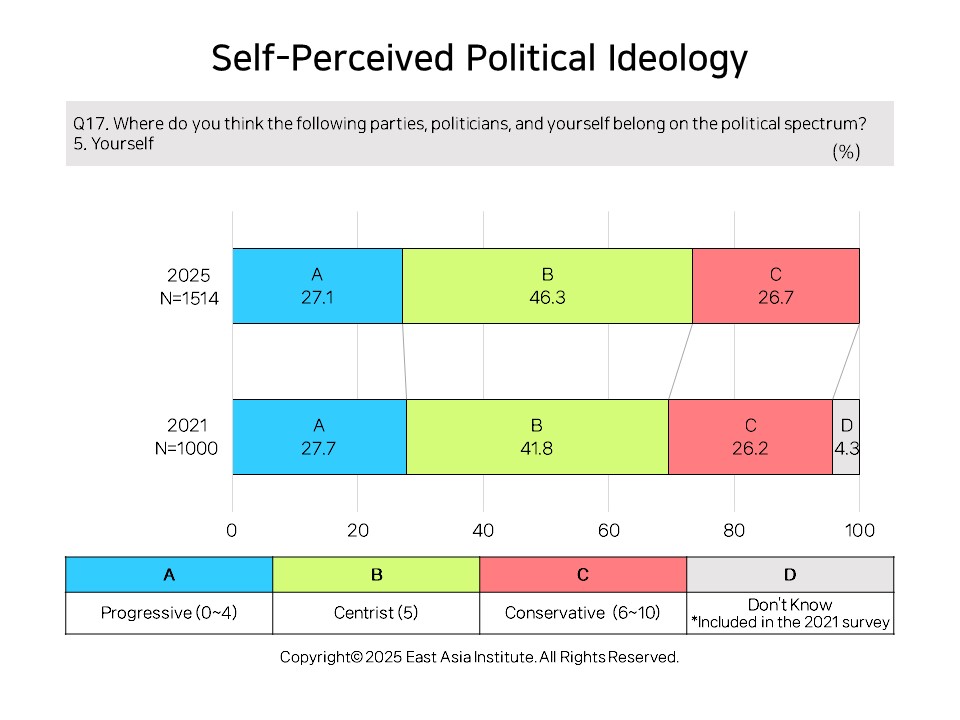
Despite this relative stability in ideological alignment, more than half of the respondents expressed unfavorable sentiments toward both the DP and the PPP. Specifically, 54.1% of respondents reported a dislike for the DP, with 25.7% expressing strong disapproval, rating the party below 10 on a scale of 100. The PPP faced even greater disapproval, with 68.7% expressing dislike and 40% assigning it a score below 10. Notably, these figures reflect an increase of over 10 percentage points compared to four years prior (Tables 2 and 3).
The intensity of partisan hostility felt by the supporters of each party to their counterparts is particularly striking. An overwhelming 93.3% of PPP supporters viewed the DP as “unfavorable,” with 58.8% assigning it a score below 10. Similarly, DP supporters exhibited analogously strong aversion toward the PPP (Tables 4 and 5). Among those who expressed disdain for the DP, 44% remarked a “disgust” and a desire to see the party completely expunged from politics, while 60.6% of PPP detractors shared a similar sentiment (Table 6). These findings indicate that nearly half of respondents feel such strong antipathy that they advocate for the complete exclusion of the major party they oppose from political affairs.
[Table 2] Party Favorability: DP
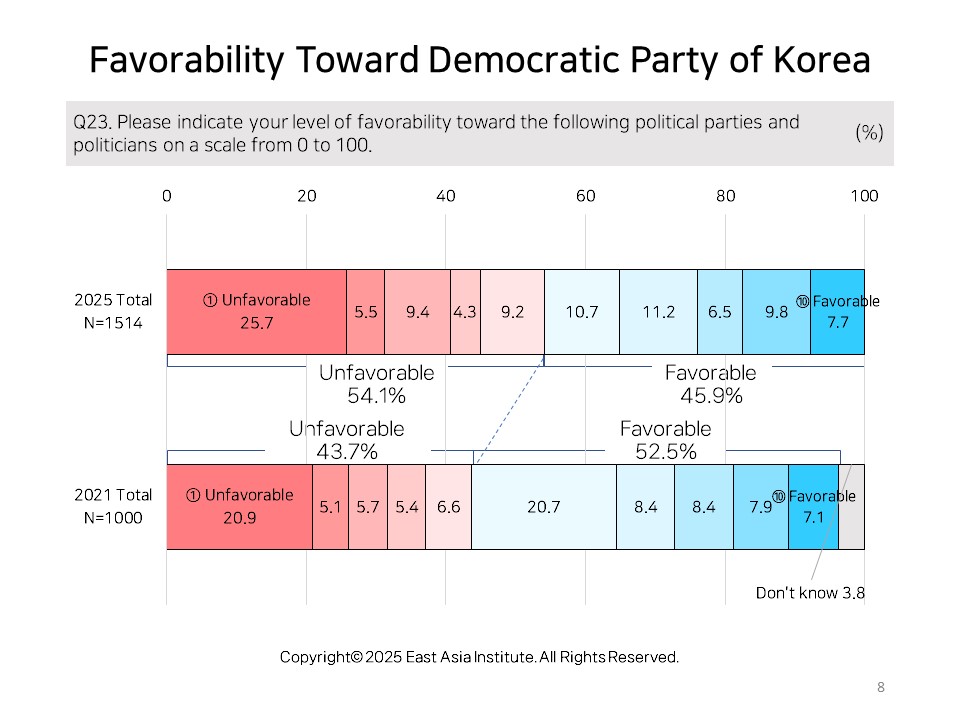
[Table 3] Party Favorability: PPP
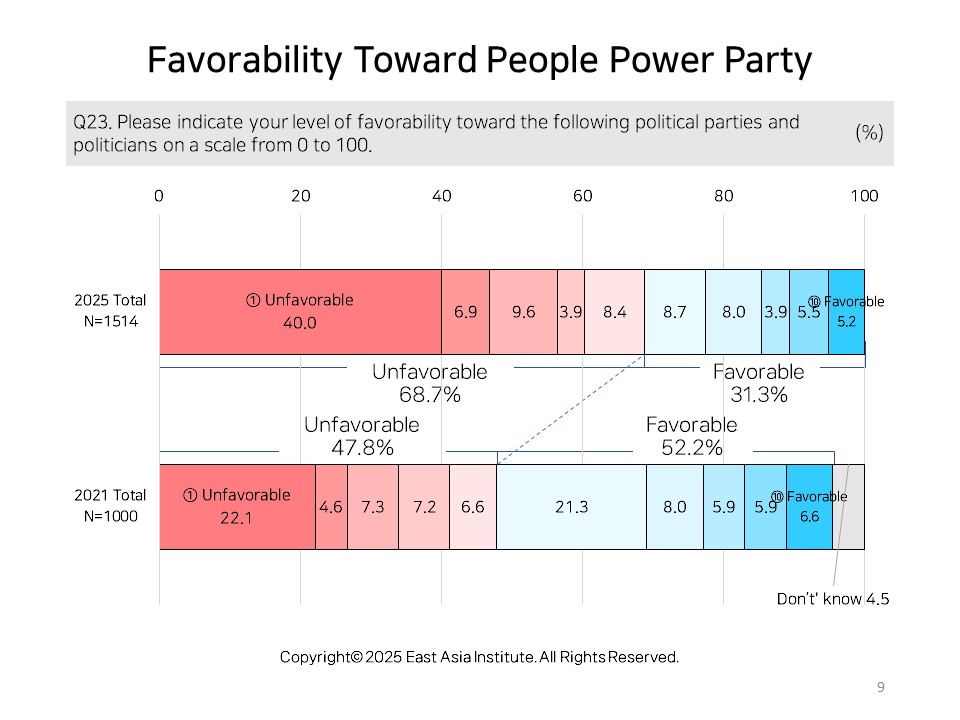
[Table 4] PPP Supporters’ Favorability Toward the DPM
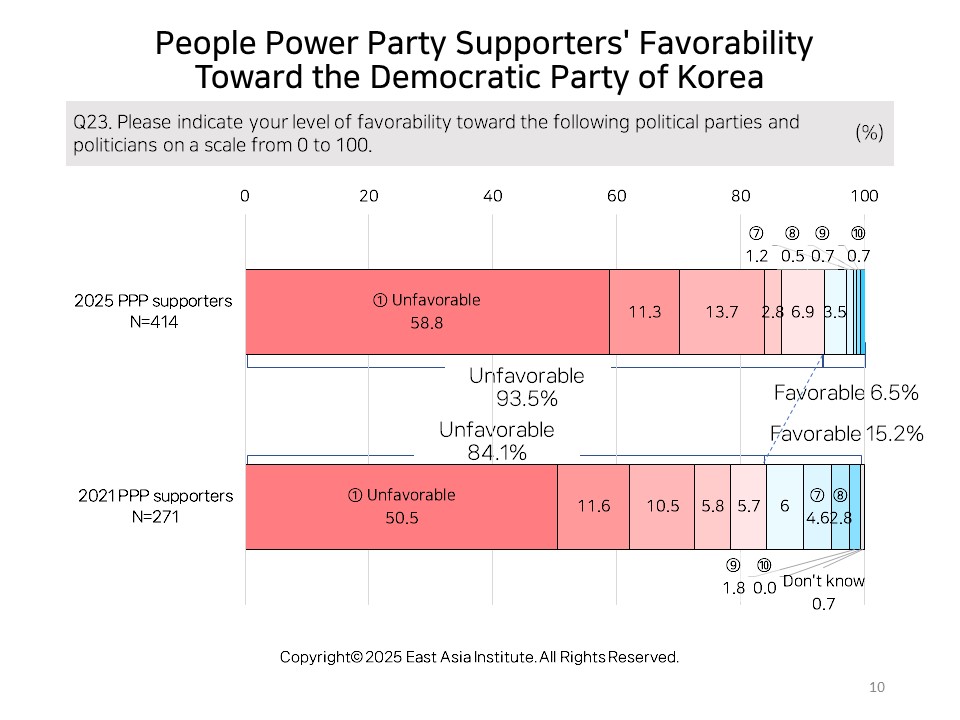
[Table 5] DP Supporters’ Favorability Toward the PPP
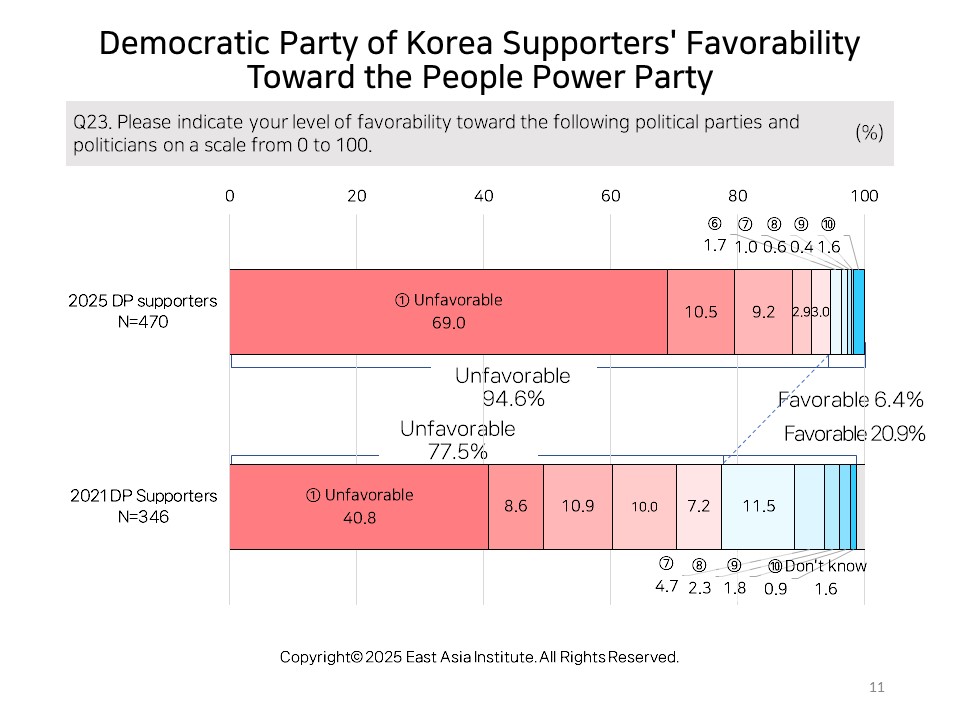
[Table 6] Emotional Reactions to Political Parties/Politicians
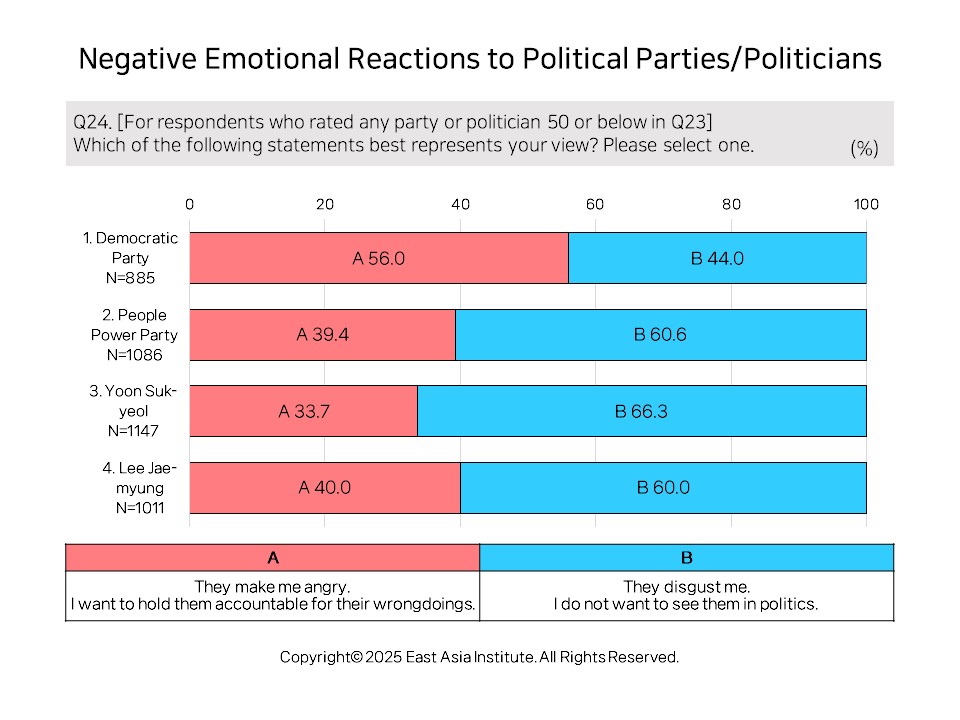
It is evident that the state of political polarization in South Korea is deeply intertwined with partisan identity, manifesting in strong emotional responses such as outright rejection of opposing parties. This division is reflected in patterns of unconditional loyalty toward one’s own party and its leadership, coupled with intractable aversion to rival parties and their leaders. The consequences of this growing polarization are especially alarming in the realm of foreign policy, where bipartisan cooperation is imperative in safeguarding national interests.
III. Polarization and Foreign Policy
In recent years, political polarization has emerged as a key subject in international political science due to its impact on U.S. foreign policy. Excessive polarization in U.S. politics has raised concerns that it could diminish U.S. hegemonic influence, weaken its bargaining power abroad, and undermine its international image and soft power (Walt 2019). Against this backdrop, researchers have conducted various studies examining the widening perception and policy differences between the Democratic and Republican parties on major international issues, the institutional consequences of political polarization, and its impact on foreign policy execution (Friedrichs and Tama 2024). Polarization is not limited to the United States, however; it is a ubiquitous phenomenon in Europe and other advanced countries, and South Korea is no exception.
Though internal disagreements over salient foreign policy issues, such as the stance most germane to North Korea, have always existed, both the public and political leaders have generally upheld bipartisan support for key diplomatic principles. The majority of conservatives and progressives, as well as supporters of the PPP and the DP, share a consensus on the imperative nature of the ROK-U.S. alliance as the cornerstone of security, support an open international economic order, and agree on active engagement with international organizations addressing global issues.
However, notable differences emerge in the policy priorities of the two parties’ supporters when examining more specific policy areas beyond the broader picture. According to the EAI public opinion survey in 2025 ([Table 7]), conservatives (PPP supporters) emphasized fortifying the ROK-U.S. alliance as the top priority in policy towards the United States, while progressives (DP supporters) prioritized establishing a more equal and impartial partnership. Among conservatives, 50.4% chose “strengthening the alliance” as the most important issue, compared to 26.6% among progressives, reflecting a gap of 23.8 percentage points. Conversely, 32.6% of progressives prioritized an “equal partnership with the United States,” compared to 9.8% of conservatives, showing a difference of 22.8 percentage points.
[Table 7] Top Policy Priority toward the United States (By Political Ideology)
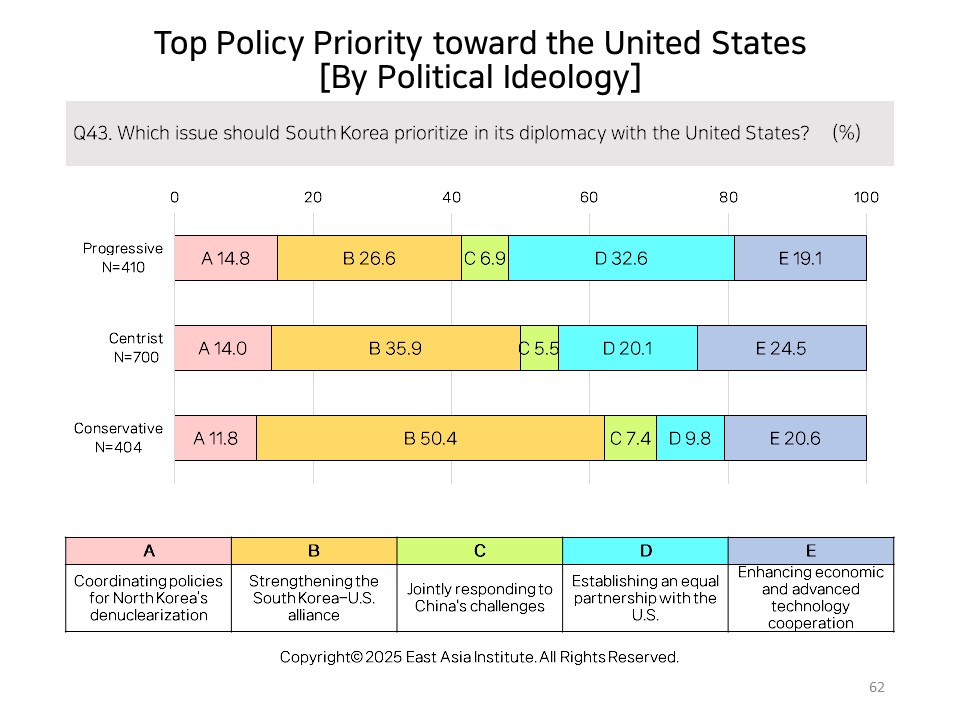
When it comes to the appropriate policy direction toward North Korea, conservatives prioritize strengthening South Korea's security, while progressives emphasize expanding inter-Korean exchanges. While 41.5% of conservatives selected “strengthening security posture” to be of utmost importance, 17% of progressives said the same, showing a 24-percentage-point difference. Meanwhile, 44.6% of progressives ranked “expanding inter-Korean exchanges” as a priority, compared to 15.7% of conservatives, a gap of 28.9 percentage points ([Table 8]).
[Table 8] Top Policy Priority toward North Korea (By Political Ideology)
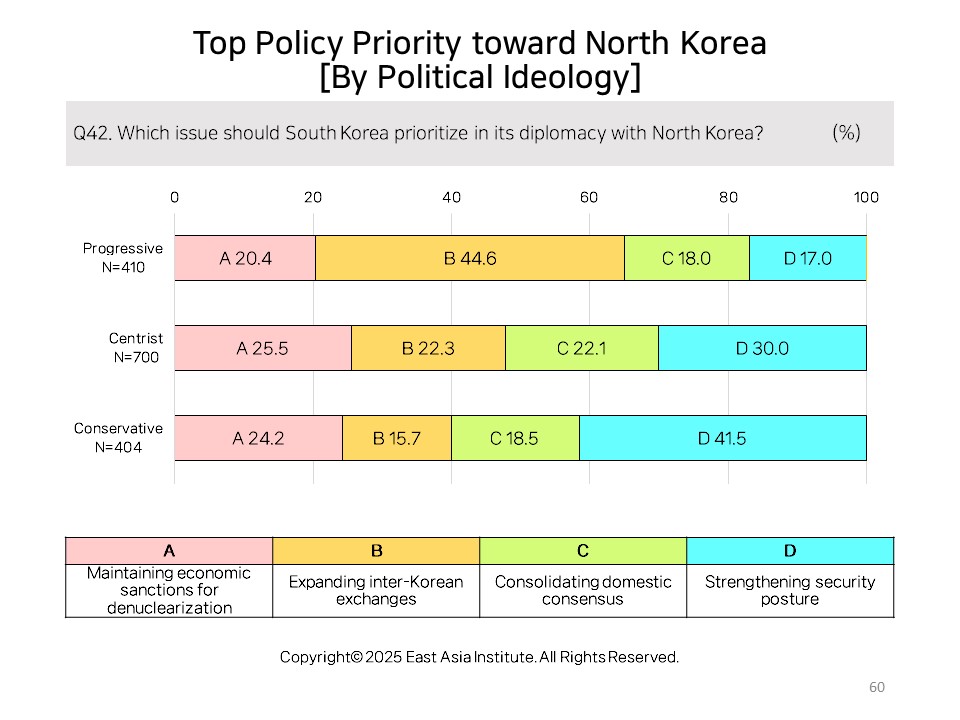
In policy towards Japan, conservatives generally center on functional, future-based cooperation, while progressives advocate for the resolution of historical tensions. Among conservatives, 55.5% prioritized “future-oriented” cooperation, compared to 26.8% of progressives, a 28.7-percentage-point gap. In contrast, 56.2% of progressives prioritized “resolving historical issues,” compared to 24% of conservatives, a difference of 32.2 percentage points ([Table 9]).
[Table 9] Top Policy Priority toward Japan (By Political Ideology)
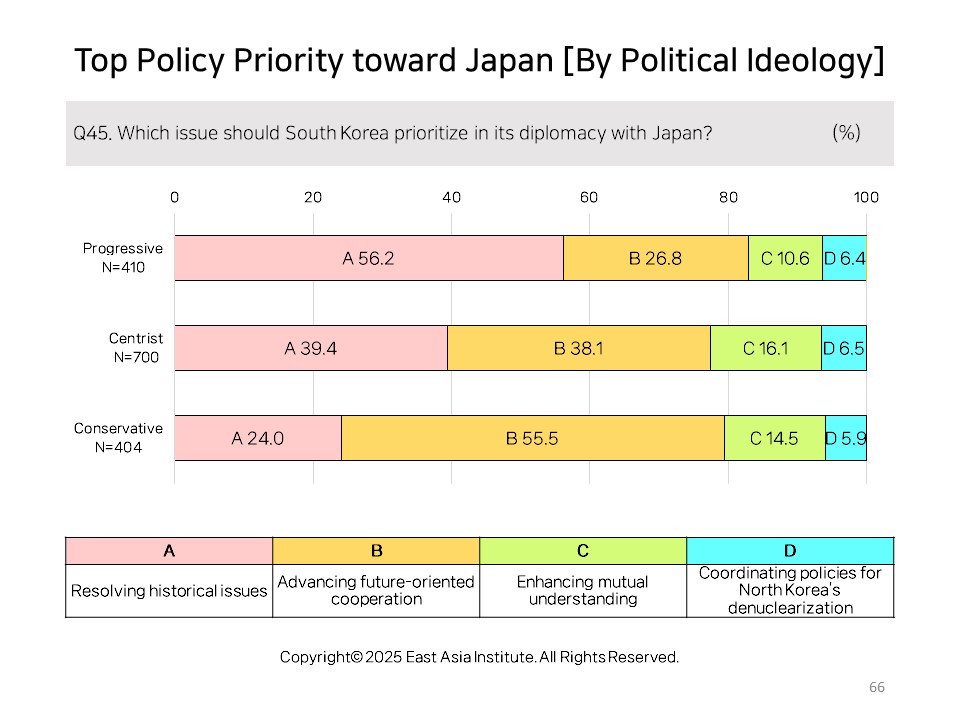
Finally, a notable confluence between conservative and progressive ideological camps is observed in perceptions of policy priorities towards China. Both groups prioritize the expansion of economic exchanges, with 28.1% of conservatives and 33.6% of progressives identifying this as their primary concern, reflecting a marginal difference of 5.5 percentage points. The second priority for both groups is collaboration on non-governmental issues such as fine dust pollution, climate change, and infectious diseases, with 22.6% of conservatives and 23.6% of progressives selecting these matters. Similarly, the third priority, responses to economic sanctions, shows little variation, with 19.7% of conservatives and 20.8% of progressives supporting this issue ([Table 10]). Furthermore, both conservatives and progressives hold strongly unfavorable views toward China.
[Table 10] Top Policy Priority toward China (By Political Ideology)
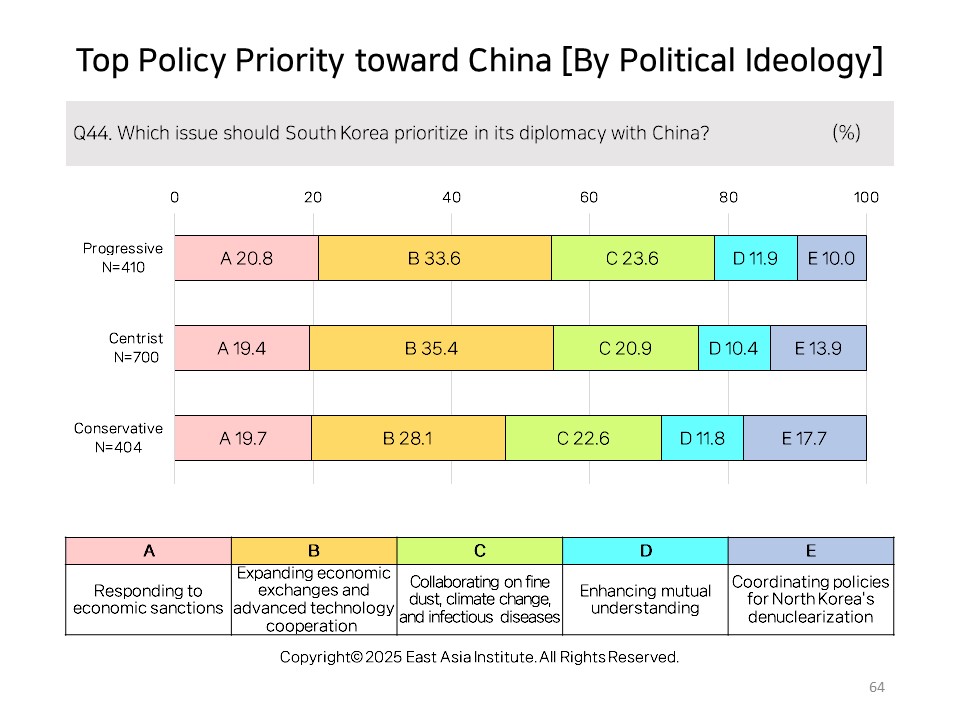
Though it is often perceived that fortification of trilateral military cooperation between South Korea, the United States, and Japan largely enjoys bipartisan support, polarization is evident on this issue as well. An overwhelming majority of conservatives (84.6%) support such cooperation, while the support rate among progressives is 55.1%, which is 29.5 percentage points lower. Meanwhile, opposition to cooperation stands at 32.9% among progressives and 12.6% among conservatives, showing a difference of 20.3 percentage points ([Table 11]).
[Table 11] Opinion on Strengthening ROK-U.S.-Japan Trilateral Cooperation on Military Security
[By Political Ideology]
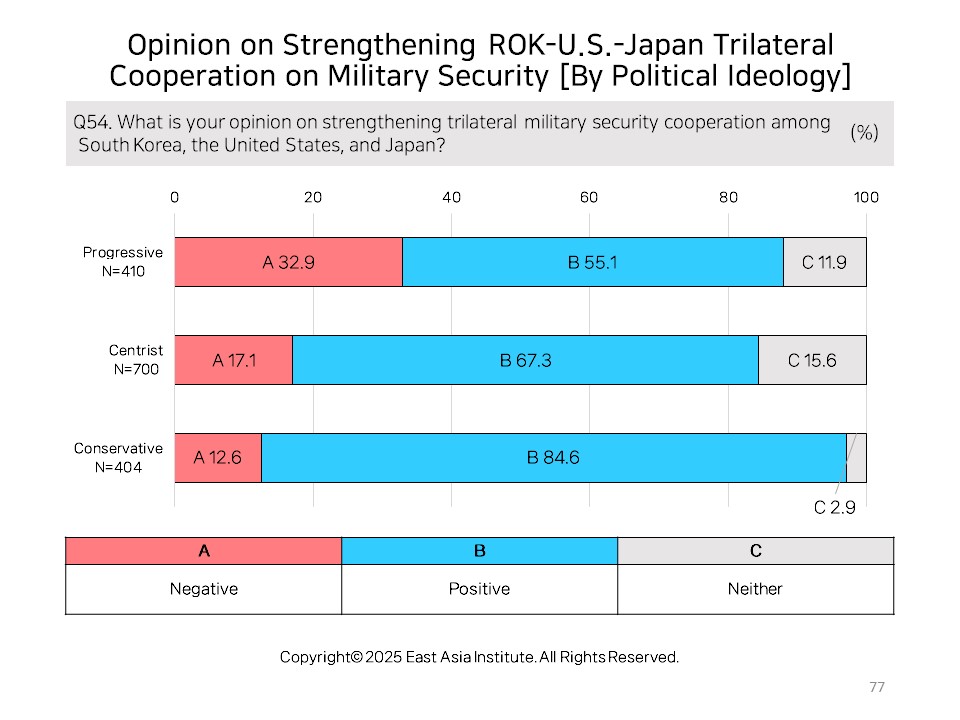
Hence, it may be extrapolated that the degree of polarization in foreign policy varies significantly across different issue areas. While overall polarization is increasing, policies related to Japan and North Korea exhibit notably higher levels of partisan division compared to other domains. In contrast, policies toward the United States reflect smaller partisan differences, and approaches toward China reveal minimal partisan divergence.
This pattern suggests that the differences in foreign policy stances between the two political camps do not necessarily stem from fundamental differences in beliefs, values, and ideologies regarding international politics. Within the progressive camp supporting the DP, it is challenging to identify a clear ideological common denominator that connects policies such as expanding engagement with North Korea, recalibrating relations with the United States on a more equal basis, prioritizing the resolution of historical issues with Japan, and expanding economic exchanges with China. Similarly, the policy preferences of PPP supporters, which emphasize deterrence toward North Korea, strengthening the ROK-U.S. alliance, prioritizing functional cooperation with Japan, and expanding economic exchanges with China, cannot easily be explained by conservative ideology.
While South Korea’s polarization is frequently characterized as a conservative-progressive dichotomy, it should be understood not as an expansion of ideological differences but rather as a widening of emotional distance between the two political camps, manifested as increased mutual antipathy. Consequently, foreign policy preferences should be viewed as extensions of domestic political and partisan polarization. The policy preferences of the conservative camp are fundamentally based on criticism of and opposition to the policies implemented by their political competitors (the Moon Jae-in administration), while the policy preferences of the progressive camp similarly result from criticism of and opposition to the policies of their political rivals (the Yoon Suk-yeol administration). This dynamic indicates that preventing or diminishing the achievements of the opposing side takes precedence over advancing common interests (i.e., national interests).
An examination of the increasingly polarized South Korea-Japan relations clearly demonstrates how partisan interests influence perceptions of Japan and preferences for Japan-related policies. Over the past four years, public opinion trends regarding the South Korean government’s approach toward Japan (specifically regarding relationship improvement) reveal that conservatives transitioned from a negative stance to a positive one, while progressives shifted from a positive position to a negative one. Among conservatives, there was a marked increase in positive sentiment following President Yoon Suk-yeol’s proposal of the “third-party compensation plan” for the forced labor issue in March 2023, which led to an improvement in bilateral relations. Conversely, progressives exhibited a sharp decline in support beginning in 2022, coinciding with the governmental transition. This evidence suggests that support for and opposition to Japan-related issues are distinctly divided along partisan lines.
[Table 12] Government’s Attitude Toward Improving Korea-Japan Relations [By Political Ideology]
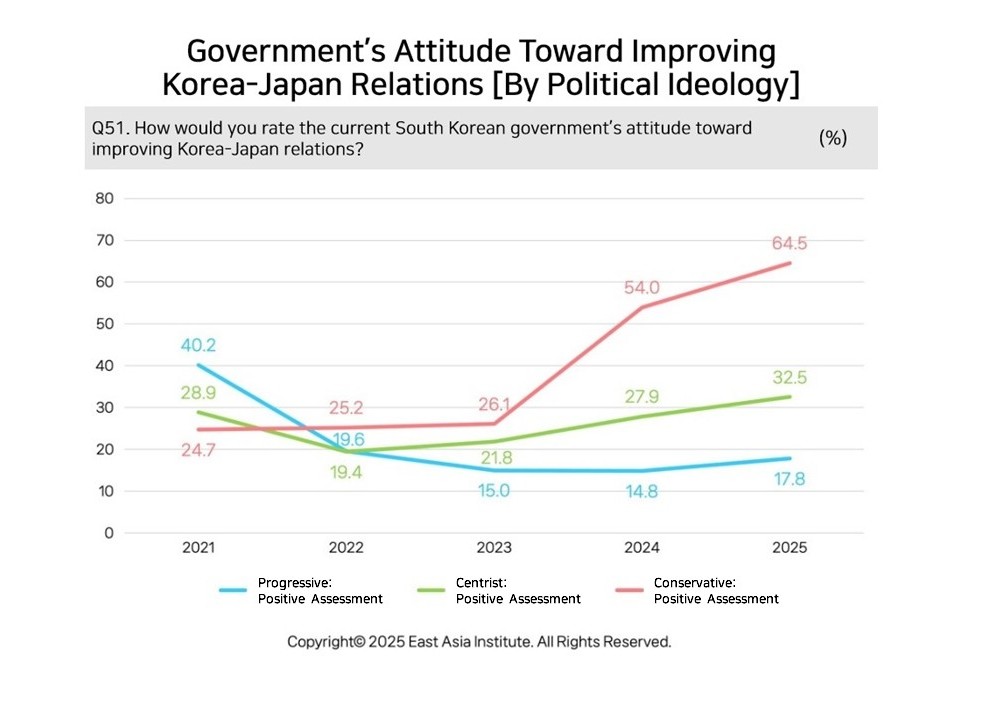
Generational disparities are also evident. Since 2024, individuals in their 70s have rapidly shifted toward supporting the South Korean government’s efforts to improve relations with Japan, making them the most supportive age group ([Table 13]). This change is particularly noteworthy given that this demographic has historically maintained the most negative perceptions of Japan. Previous data from the “ROK-Japan Relations as Seen in Public Opinion: 2013-2023,” jointly conducted by EAI and Japan’s Genron NPO, indicate that younger generations (those in their 20s and 30s) have consistently held more favorable perceptions of Japan, while the 70-and-older demographic exhibited the most negative views (Son and Lee 2024). Concurrently, individuals in their 40s demonstrate the most negative perceptions of the government’s Japan policy, a pattern that corresponds with their strong support for the Democratic Party.
[Table 13] Government’s Attitude Toward Improving Korea-Japan Relations [By Generation]
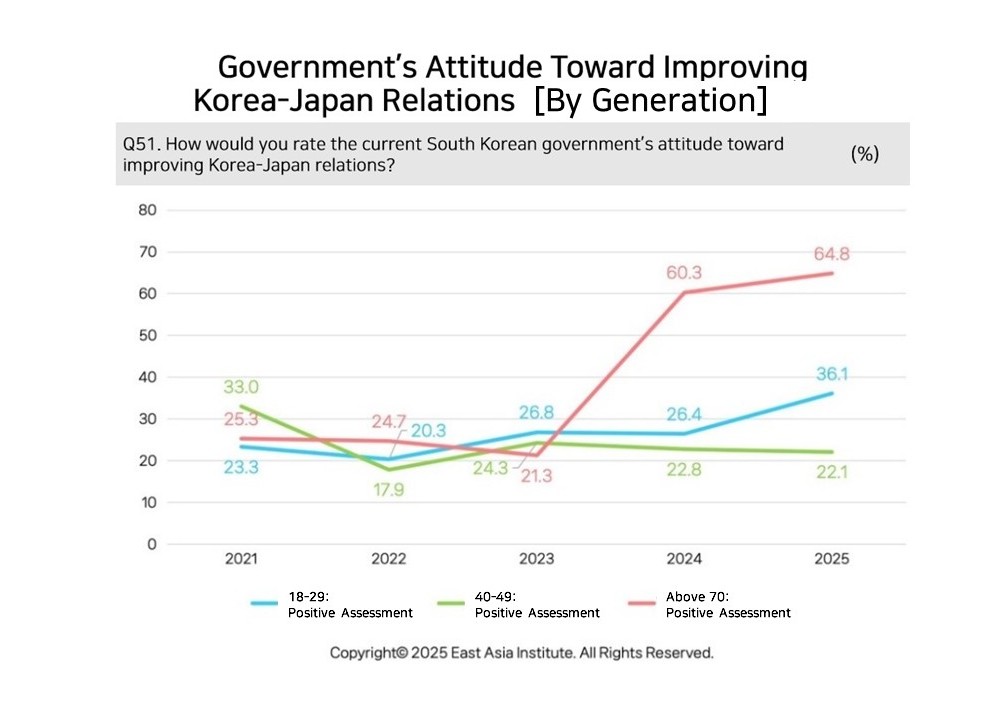
The public divide evident in polling on national policy towards Japan as well as a general assessment on bilateral relations uncovers an evident delineation between DP and PPP supporters, progressives versus conservatives, and between those in their 40s versus those in their 70s. This polarization is often characterized by negative partisanship, where opposition to the ruling party is driven less by substantive policy disagreements and more by a fundamental aversion to the party itself. As a result, both sides frequently prioritize the failure of their opponents over the achievement of shared national objectives. Even when recognizing the strategic importance of improving bilateral relations or strengthening trilateral security cooperation with the United States, partisans may withhold support to prevent the opposing party from claiming credit.
The ruling party leadership, particularly the president, frequently advances policy through unilateral decision-making, prioritizing internal party consensus over broader political dialogue. The Yoon administration epitomizes this problematic governance style. In proposing a “third party compensation” plan to resolve historical disputes, the administration initiated a series of high level summits that ultimately restored government-level trust. However, these diplomatic initiatives were pursued through a unilateral process devoid of consultation with the opposition, thereby exacerbating political polarization.
IV. Conclusion
The state of entrenched political polarization in South Korea is inimical to democratic norms, as it fosters popular support for authoritarianism, augments populist tendencies, and undermines effective governance and policy innovation. This bifurcation extends beyond domestic affairs and to create significant divisions in public opinion on foreign policy. However, these divisions do not primarily stem from ideological or principled differences concerning international affairs. Rather, they reflect an extension of domestic partisan conflicts, often exacerbated by political elites. The adversarial nature of political leadership further intensifies polarization, allowing these divisions to permeate the broader public.
Internal fragmentation risks not only significantly weakening South Korea’s diplomatic leverage but also leading to a protracted decision-making process and inadequate compromise. Most critically, persistent partisan confrontations marginalize the moderate majority, making bipartisan foreign policy increasingly difficult to achieve. At a time when South Korea faces pressing geopolitical challenges, including the restructuring of the global order amid the relative decline of U.S. hegemony, economic disruptions caused by de-globalization, intensifying technological competition in fields such as artificial intelligence, and escalating threats from North Korea’s nuclear and missile programs, political consensus is crucial for developing a ‘coherent and sustained national strategy.’
Institutional reforms aimed at mitigating polarization will be essential not only for revitalizing South Korean democracy and improving governance but also for strengthening the country’s international influence. While current efforts for reform primarily focus on restructuring the systern of ‘imperial presidency,’ equally important are measures that amplify and represent the perspectives of the centrist majority, whose voices have been increasingly sidelined by partisan polarization. ■
V. References
Friedrichs, Gordon and Jordan Tama, eds. 2024. Polarization and Foreign Policy: When Politics Crosses the Water’s Edge. London: Palgrave.
Ha, Shang E. 2022. “Political Polarization among Korean Voters (In Korean).” Korean Social Trends 2022. Statistics Research Institute.
Sohn, Yul, and Junghwan Lee. 2024. ROK-Japan Relations as Seen in Public Opinion: 2013-2023 (In Korean). Seoul: East Asia Institute.
Sohn, Yul. 2024. “Polarization and South Korea’s Japan Policy: Key Takeaways from the 2024 Public Opinion Survey on Korea-Japan Relations (In Korean).” EAI Issue Briefing. https://eai.or.kr/new/ko/pub/view.asp?intSeq=22716&board=kor_issuebriefing.
Walt, Stephen. 2019. “America’s Polarization is a Foreign Policy Problem, Too.” Foreign Policy. March 11. https://foreignpolicy.com/2019/03/11/americas-polarization-is-a-foreign-policy-problem-too/.
■ Yul Sohn is President of East Asia Institute (EAI) and Professor at Yonsei University.
■ Translated and Edited by Chaerin Kim, EAI Research Assistant
For inquiries: 02 2277 1683 (ext. 208) | crkim@eai.or.kr
Center for Democracy Cooperation
South Korea Democracy Storytelling
![[ADRN Working Paper] Democratic Backsliding in South Korea](/data/bbs/eng_workingpaper/20250702151055558995988(0).jpg)
Working Paper
[ADRN Working Paper] Democratic Backsliding in South Korea
Asia Democracy Research Network | 2025-04-08
![[ADRN Working Paper] The Impact of the Millennials and Gen Z on Democracy in Northeast Asia](/data/bbs/eng_workingpaper/202505231731371005535793(0).jpg)
Working Paper
[ADRN Working Paper] The Impact of the Millennials and Gen Z on Democracy in Northeast Asia
Asia Democracy Research Network | 2025-04-08